- Home
- Philip MacDonald
Murder Gone Mad Page 7
Murder Gone Mad Read online
Page 7
‘Yes, yes!’ Rockwall seemed now to have mastered his voice. It was still high-pitched and strained, but the note of hysteria had gone.
‘Yes,’ he said again, ‘yes. But there’s been another of these … in Links Lane … I was walking down there. I was going home. I tripped over something in the road. It … it …’ He put up long, lean fingers and for a moment covered his face.
Pike pushed forward a chair. ‘You’d best sit down, sir,’ said Pike. His voice was calm and soothing and matter-of-fact.
Rockwall sank into the chair. From a pocket of the black, long-skirted coat he took a crumpled handkerchief and with it mopped the bony brow which glistened with great beads of sweat. ‘I’m sorry,’ he said. ‘I’m sorry … What I stumbled against was the body of a man. I could … I could tell that he was dead. He had … he had … there was a wound in his stomach.’ He shuddered and looked at his right hand.
Pike’s small, bright eyes looked at the hand without seeming to look. They saw that on the ball of the thumb was a dark, drying stain. Pike said, quietly:
‘How long ago was this, sir? Don’t worry to tell us any more. Just answer my questions, if you would be so good.’
‘It seems,’ said Rockwall, ‘hours! But it can’t be. I came here … I ran … all the way. I don’t know how long it took me.’
Jeffson looked at Pike’s raised eyebrows then, calculatingly, at his other visitor. ‘Call it a quarter of an hour to twenty minutes,’ said Jeffson.
‘Did you,’ Pike said to Rockwall, ‘see anybody else on your way? After, I mean, you had found the body and were coming here?’
The white head was shaken. ‘No. Not a soul. All the way I was looking for someone. I felt that I should never get here.’
Pike’s hands were deep in his pockets and his eyes were fixed upon the shining toe-caps of his boots. He rocked a little from heel to toe. He was silent for a long moment. And then the hands came out of his pockets, the rocking ceased and he turned to Jeffson. He said:
‘Get in touch with the patrol stations. Tell ’em to pull in everybody from now on. Get ready yourself. I’m going to get the car. Bring a man with a bicycle. I’ll be back in four minutes. Mr Rockwall, will you please stay here and then accompany us.’
III
Two bright streams of white light—one stream from the headlights of the blue police Crossley, the other from the headlights of the Holmdale Cottage Hospital Ambulance—flooded the narrow hedge-lined summit of Links Lane. Where the two floods intersected in an oddly theatrical pool of whiteness, a group of men stood looking down at something which lay upon the road. The road was black under the white glare. The hedges were black, thick tracery against blue-black night. Every little irregularity in the road’s surface showed under the lights as a bump and a dip eight times their real size.
Pike came suddenly into the centre flood of light.
‘That’s that!’ he said curtly.
‘Anything, sir?’ said Jeffson.
Pike shook his head. ‘Not a thing.’
‘No … trace?’ said Rockwall.
Again Pike shook his head. ‘Not a trace, sir.’ He bent his head to look down at the sprawled thing, now covered roughly with a blanket from one of the ambulance stretchers, which lay at their feet. ‘What could you expect? The Butcher keeps his weapon and I don’t suppose ever so much as touches his victim. There’s a hard frost and even if there wasn’t this surface wouldn’t take any prints … No, there’s nothing. Nothing at all … Jeffson, you’d better tell the ambulance men to take this away.’ He nodded at the bundle which, so short a time ago, had been Albert Rogers. ‘The only thing we’ve got to be thankful for at the moment is that somebody knows who he is.’
For a moment Jeffson stood motionless looking down.
‘Poor kid,’ said Jeffson. And then, lifting his head sharply, turned and strode off and became brusquely official with the ambulance men.
Pike moved nearer to the cleric and looked at him. Pike said: ‘You’re sure, sir, that the body hadn’t been moved since you saw it?’
Rockwall shrugged thin shoulders helplessly. ‘So far as I can tell, Superintendent, the poor fellow hadn’t been moved … But you must understand … you must understand that I … I … I was overwrought … when I—’
‘Quite, sir, quite. I just wanted to make sure … Jeffson!’
‘Yes.’ Jeffson came trotting up, moving his bulk lightly.
‘Did you say something about this boy having had a girl?’
Jeffson nodded. ‘Yes. That’s right. Mary Fillimore it is. In service. Parlourmaid at Mrs Sharp’s in Tall Elms.’
The ambulance men came shuffling with a stretcher. They set the stretcher down. They stooped and lifted the shell of Albert Rogers and soon bore it away.
Pike went on as if there had been no interruption. ‘Happen to know where they used to meet? Here?’
Jeffson shook his head. ‘Couldn’t say. We could wake the girl. Shall we? Or get her in the morning?’
Pike considered this. ‘In the morning,’ he said at last.
Jeffson, tilting his helmet forward over his eyes, scratched the back of his head. ‘What’s to do now, then?’
‘Get back.’ Pike was curt. ‘Get back and see if they have pulled anyone in. What’s the time?’
Rockwall answered this. He pulled out a watch, bent to see its story by the lights of the Crossley and said: ‘Fifteen minutes to eleven.’ He seemed calm now and in the thin face the blue eyes too were calm. The hand that held the watch did not tremble and the voice, though high-pitched still, was steady.
‘Thanks,’ said Pike. ‘Now we’ll get back. Jeffson, send that bicycle man of yours the round of the patrols.’
‘I wonder,’ said Rockwall, ‘whether you would let me ride in your motor car as far at least as the beginning of Marrowbone Lane. This … this …’
‘Of course, sir.’ Pike was quietly genial, in great contrast to his official curtness. ‘Come along.’
There came a sudden roar as the engine of the ambulance started and then a swinging of its light beams. It backed, turned, and then, with a soft purring in place of its roar, was gone. Against the hedge Jeffson spoke with a dim shape standing by a glittering bicycle.
Pike, his hand courteously ready to assist, led Rockwall to the car, settled him in the front seat and wedged himself into the driver’s seat beside him. Jeffson came running and climbed into the back. More swinging of lights. More backing and turning. Another, deeper purr as the Crossley went …
Links Lane was once more its black and empty and silent self.
IV
The hands of the clock upon Jeffson’s mantelpiece stood at five minutes to midnight. The little room seemed crowded. Behind the plain deal table, which seemed to be the end of parlour and the beginning of office, sat Pike in a chair with arms and Jeffson upon a chair without arms. Before the table, at an angle to them, sat huddled in one of the parlour armchairs the thin length of the white-haired clergyman. By the door, upright, uncomfortable and yet most pleasurably excited, sat, nursing an awkward helmet upon more awkward knees, Police Constable 4123 George Birch.
Pike was speaking to the Reverend Lucius Charles Arbuthnot Rockwall.
‘… I think that’s all. No, there’s one other thing. If you wouldn’t mind telling me, sir, purely, of course, as a matter of form, what the business was which had taken you, in these strange times, to such a place that you had to walk back through Links Lane?’
‘Certainly. Certainly.’ Rockwall sat upright in his chair with a sudden spring almost inhuman to view. ‘I had been to visit a sick parishioner of mine, who lives in the farm cottages at the top of Links Lane just within my cure—’
‘Who’s that, sir?’ Jeffson put in. ‘Joe Starr?’
The white head was shaken. ‘No. Sarah Queen. You know her, Sergeant? Of course you do! Poor old dame! I’m afraid she won’t last another week.’
‘What time, sir,’ said Pike, ‘did you get to this woman�
��s cottage?’
The heavy lids were lifted from the strange blue eyes. ‘I really couldn’t say, Superintendent.’
Pike was looking down at the pencil with which his hands were toying. He spoke without raising his eyes. He said: ‘Surely, sir, you could give us some idea.’
From Rockwall’s mouth there came a queer sound, presumably a laugh. Its end was as sudden as the death of the sound of a loud speaker peremptorily disconnected.
‘I daresay,’ said Rockwall, ‘that I could … Let me think … I left my house immediately after my small evening meal … I should say, Superintendent, that that was at somewhere between seven and half-past. I remember that I did not want to go out but I had promised old Sarah that I would. I walked straight—’
‘Just one moment, sir!’ Pike’s interruption was suave but interruption nevertheless. ‘Did you walk to the cottage by the same way that you came back? Through Links Lane, that is?’
Rockwall shook his head. ‘I did not, Superintendent. I took the short-cut over the golf course half-way up Tall Elms Road.’
‘But you came back,’ said Pike mildly, ‘by the longer road?’
Rockwall nodded. For a moment the very poll of the white head was presented to Pike’s eyes. ‘I came back,’ said Rockwall, ‘by the longer road … as you say … The reason, Superintendent, was that it was so dark tonight that I had a great deal of trouble walking over the golf course …’ His thin lips curved into a self-deprecatory smile. ‘As a matter of fact I twice measured my length upon the grass, tripping first over a wire fence which I altogether failed to see and secondly stumbling down over the edge of one of the greens. I really thought it safer, after leaving old Sarah, to walk back by the road … Thank God that I did. Otherwise …’
‘Otherwise what, sir?’ said Pike. His tone was gently curious and he still did not raise his eyes.
Rockwall stared. There was an instant’s silence. ‘Otherwise …’ he said, ‘otherwise … Why, Superintendent? I am afraid I do not follow you. If I had not chosen to go back by Links Lane, I should not have … I should not have … made my terrible discovery, and if I had not … the … the … it might have been lying there still, uncared for and untended.’
‘Yes,’ said Pike. ‘Yes. I see, sir … And we know from what you’ve already told us that it was somewhere about twenty minutes past nine when you found … when you made the discovery.’
A film of vagueness seemed to have come over Rockwall’s lean, lined face and his eyes, too, were now dull. He waved a white, thin, long-fingered hand. ‘As you say, Superintendent. As you say.’
‘Now the walk across the golf course, I should say, would take you …’ Pike looked at Jeffson.
Jeffson twitched burly shoulders. ‘Say half an hour.’ He looked at Rockwall. ‘Do you agree, sir?’
Once more the hand was waved while the other hand rested upon the arm of the chair supporting the white head. ‘Yes. Yes. I should think you are right. I have never timed the walk. Yes. Yes. I should say half an hour. Quite half an hour. A full half-hour.’
Pike ceased to play with his pencil. ‘So that you would have arrived at the cottage of this Sarah Queen at about eight o’clock and, as I see it, the walk from the cottage to where this man Rogers was killed would take somewhere between five and ten minutes. You got to the cottage at eight and you left at a quarter-past nine. A longish visit, wasn’t it, sir?’
Rockwall closed his eyes. ‘Why, yes. But that poor old dame, she’s like all the rest of them … she was afraid.’ He raised his head from his hands and the lids from his eyes. He stared hard at Pike. ‘She was afraid, Superintendent, of death … I gave her what comfort I could. One cannot tear oneself away on those occasions.’
‘Quite, sir. Quite.’ Pike looked at Jeffson again. ‘I don’t think we need keep Mr Rockwall any longer unless, Jeffson, there’s anything you’d like to—’
Jeffson shook his head. ‘No, sir. No.’
Pike rose and came out from behind the table. Rockwall rose to meet him. For a moment they looked at each other.
‘I will be going on my way then,’ Rockwall said. ‘If there is anything further I can do—any small assistance which may lie within my power—I hope you will—’
Pike nodded. ‘Thank you, sir. We’ll certainly call upon you. We are, of course, much indebted to you for acting so promptly and properly.’
Jeffson opened the door. Police Constable George Birch sprang to his feet and stood, lumberingly, out of the way. There was a moment’s silence. Tall and bent and almost unbelievably thin, Rockwall stood in the centre of the little room. His eyes were darting glances here and there about the furniture.
‘Lookin’ for something, sir?’ Jeffson said.
‘Eh?’ said Rockwall, suddenly raising his eyes. ‘Oh, thank you, Sergeant. Thank you. It was … I was looking for my hat.’
‘Hat, sir?’ said Jeffson and began, too, to look.
Pike interposed. ‘When you came, sir, you had no hat with you,’ he said quietly.
‘Eh?’ Rockwall stared. ‘Oh, yes … yes … yes. It must have been lost in my run. Thank you. Thank you. Good-night!’
He went through the door and into the passage in which there was now a light. At a nod from his Sergeant, Constable Birch followed along the passage and opened the front door.
Inside the room Pike and Jeffson, looking at each other in silence, heard the click of the door shutting and then slow, weary-seeming footsteps ringing down the frozen path.
CHAPTER VI
I
PIKE looked at his watch. The hands stood at half an hour after midnight. He looked at Jeffson. He said:
‘About time we were hearing whether the patrols have got anyone, isn’t it?’
Jeffson nodded and crossed the room with heavy tread to the corner where, upon a small and rickety table, the official telephone stood. He picked up the receiver and asked for a number. Pike walked over to the window, edged his way behind a parlour table and stood looking out into the dark, cold night. He drummed with his finger tips upon the glass. Behind him in the warm, brightly lighted little room Constable Birch was striving to master a November cough and Jeffson was holding a muttered conversation with his telephone. Pike went on staring into the darkness. He did not turn until, with the click of a replaced receiver, Jeffson spoke once more in his normal voice.
‘They’ve got three,’ said Jeffson.
Pike wheeled, nearly knocking over the little table. ‘Where are they?’
‘One,’ said Jeffson, ‘down at the police hut by the station and two on the way here now. What shall I do, sir? Tell ’em to get the one from the station up here as well?’
Pike nodded. Once more silence fell. Constable Birch mastered his cough. Jeffson sat upon the edge of the official table and swung massive legs. Pike turned again to the window.
It seemed nearly as many hours, but it was actually ten minutes, before there came the sound of footsteps upon the road outside. Jeffson nodded at Constable Birch, who, putting on his helmet, left the room. They heard his heavy tread in the passage and then, simultaneously with the sound of the front door opening, the click of the gate latch and a tramping upon the path.
Pike and Jeffson waited. There entered to them three Special Constables and two others. The senior of the Special Constables reported. He was a small and stout and excited man. Jeffson handled him well and got rid of him and his two henchmen with admirable speed. The two prisoners were left standing in the middle of the room. Again Jeffson and Pike sat behind the official table, and again Constable Birch sat by the door nursing his helmet.
The prisoners were a tall and dishevelled young man, not quite steady on his feet—Percy Godly—and a small, untidy, nervous and yet truculent person in a black felt hat, enormous horn-rimmed spectacles and a very short-coated and hairy suit.
Godly, swaying gently, rather as a young sapling sways in a light breeze, seemed content to sway. The other, if one could tell by his sudden and instantly represse
d movements and his tight-clenched mouth from which the lips seemed completely to have disappeared, was only restraining speech, and hot speech, with the greatest difficulty.
‘Sergeant Jeffson!’ Pike was smoothly official. ‘Do you know these men?’
Jeffson nodded. He indicated first the swayer. ‘That’s young Mr Godly,’ said Jeffson, ‘the other gentleman—I’m afraid I don’t know his name—is something to do with the film business.’
‘My name,’ said the small man in horn-rimmed spectacles, using a voice surprisingly deep and phenomenally fierce, ‘is Spring, Wilfred Spring, and I’d like to know what the hell—’
‘Half a minute, sir, half a minute!’ said Jeffson. Pike smiled a pleasant smile.
‘Sit down, Mr Spring,’ he said. ‘Constable, give Mr Spring a chair.’
Spring exploded. Beneath the shadowing spectacles his dark, clever, somewhat weasley face seemed to grow thinner and darker with his anger.
‘I don’t want your damn chairs,’ he said. ‘All I want to know is what the hell—’
‘Excuse me, sir!’ Pike was smooth. ‘You’ve said that before. If you wait a moment I’ll tell you. Are you resident in Holmdale?’
Spring seemed on the verge of another outburst, then controlled himself with a visible effort.
‘Yes,’ he said, ‘14 Collingwood Road.’
‘And this other gentleman?’ Pike looked at Jeffson.
‘Mr Godly,’ Jeffson said, ‘lives with his father, Mr Emanuel Godly, just outside the city at Links Corner.’
‘Qui’ ri’!’ said Mr Godly affably. ‘Absolooly ri’!’ He smiled largely upon the room. The effort seemed to unbalance him, and the sway turned into a stagger.
‘Sorry!’ said Mr Godly.
Constable Birch, displaying initiative, rose and took a chair from a corner and thrust it neatly against Mr Godly’s legs from behind and so had him neatly seated.

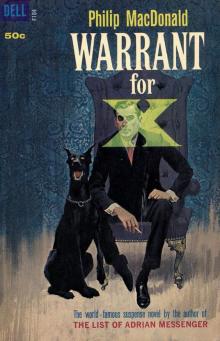 Warrant for X
Warrant for X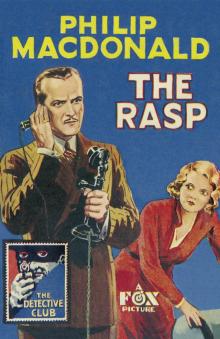 The Rasp
The Rasp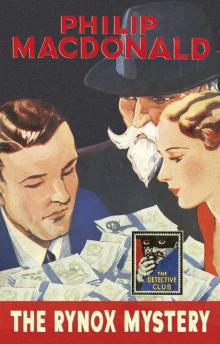 The Rynox Mystery
The Rynox Mystery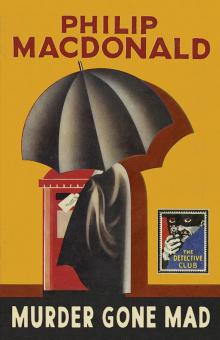 Murder Gone Mad
Murder Gone Mad The Maze
The Maze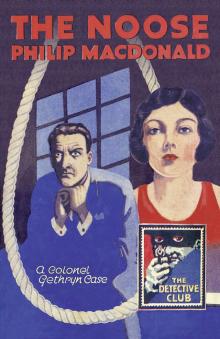 The Noose
The Noose